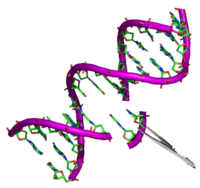
Photo from wikipedia
Damage to plant productivity due to soil salinity is a major agricultural problem, necessitating the development of effective salinity management measures. Here, we sought the potential effects of yeast and… Click to show full abstract
Damage to plant productivity due to soil salinity is a major agricultural problem, necessitating the development of effective salinity management measures. Here, we sought the potential effects of yeast and carrot extracts, and their associated mechanisms in the alleviation of seawater-induced salt stress in maize. Pretreatment of maize seeds with yeast or carrot extract provided maize plants with enormous abilities in reducing growth inhibition and biomass loss when exposed to seawater. The better growth performance of yeast extract- and carrot extract-primed plants under saline conditions coincided with improved protection of the photosynthetic pigments, chlorophylls and carotenoids. The primed plants also restricted Na+ accumulation in both roots and shoots while maintaining a higher K+ content and lower Na+/K+ ratio when compared with that of non-primed plants. Yeast extract and carrot extract also potentiated salt tolerance mechanisms by accelerating the production of osmolytes, as evidenced by accumulating levels of total free amino acids and soluble sugars, especially in the roots of primed plants during salinity. The enhanced levels of ascorbic acid and phenolic compounds, and the heightened activities of reactive oxygen species-detoxifying enzymes superoxide dismutase, catalase, and ascorbate peroxidase with concurrent reduction of lipid peroxidation in the leaves of primed plants clearly indicated a positive impact of yeast extract- and carrot extract-priming on the antioxidant system of maize under salt stress. Our results together suggest decisive roles of yeast extract and carrot extract in the management of salt-induced adverse effects in economically important maize, and perhaps other crops.
Journal Title: Journal of Plant Growth Regulation
Year Published: 2019
Link to full text (if available)
Share on Social Media: Sign Up to like & get
recommendations!